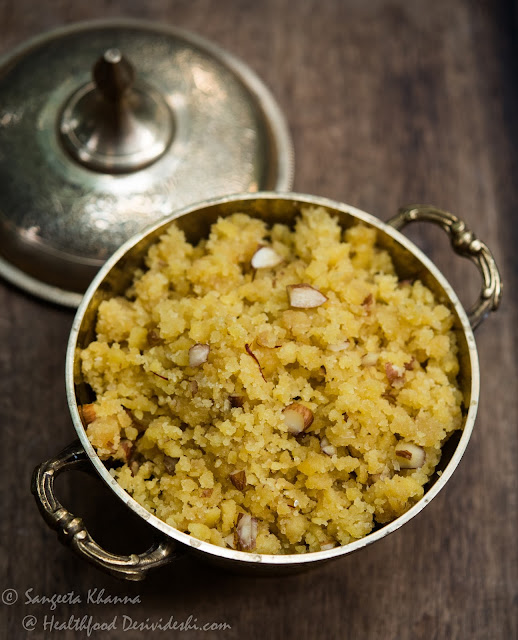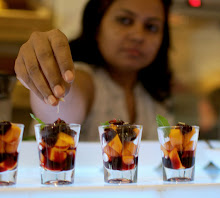Mung ka halwa is one dessert which is seen brushing shoulders with brownies, tarts, tiramisu, truffles and the likes on the modern party menus. A traditional recipe which has survived the test of time well. It is definitely higher on calories but if you eat sensibly it makes an enjoyable dessert, and if you cook it sensibly, it doesn't make your arms ache and your tummy grumble. Believe me.
Many of us dread making this halwa simply because of two reasons. One, it is too heavy and two, it takes a lot of stirring and mixing and whipping while cooking it. So much so that your arms are sore the next day. Right!!
This has been my signature dessert for many large get-togethers and as I have made it many times and in large quantities. I can say I have worked on ways to make it a bit easier and healthier, I mean a bit low on ghee and that too when you make it in smaller quantity.
When you make it in large quantity you need to have enough ghee otherwise it is tough to keep up with stirring to prevent sticking n burning in the base of kadhai......
The best way to make it in less quantity of ghee is to make it in the largest thick base kadai you have and always use a flat spatula to stir the halwa while frying (bhunoeing). Another trick for preventing your arms from getting sore, I shall describe with the procedure. read on....
ingredients....
mung dal (split and husked mung beans) 1 cup
ghee 3/4 cup
sugar 1/2 cup
a handful of almonds, slivered
procedure
Soak the mung dal in water for 2 hrs or overnight and grind it in mixie to make a smooth paste, you'll get about 2.5 cups of mung paste.
Now heat ghee in a large thick base kadai and coat the kadai well with ghee all over, keeping the flame very low, pour the mung paste in it and stir well.
The first thing you notice is, that the mung paste becomes lumpy and sticks to the base of kadai. This is enough to scare a first timer, but do not worry and keep stirring after every few minutes.
Then turn it scraping the paste from the base of kadhai and spread again to get it browned again......
Repeat the process until the mung mixture becomes nicely browned and aromatic.
Add sugar and put off the flame. Mix well and cover with a lid and let the sugar melt and get absorbed into the halwa.
Some people add cardamom powder for flavor but I feel that the aroma of fried mung daal is so delicate and mildly aromatic, that any other flavoring agent is not needed.
Mung daal halwa should taste like mung daal and not elaichi. Though you may go by your own choice. Add cardamom, rose water or whatever spice you like.
You may need to sprinkle a little milk if the mixture has become too dry. Mix well and throw in the slivered almonds (any type of nuts and any amount and serve hot.
I made it for Arvind's birthday as halwa (Kadah prasad) is made for such occasions traditionally and this time I choose mung ka halwa as he said it had been ages since I made this. These are some of the foods he loves.
I hope you noticed how I turned and stirred the cooking halwa only when it gets browned on one side. That is the trick to not keep stirring it all the time. Try doing it and let me know if you liked this slightly dry mung ka halwa.
You can add a little milk every time you reheat it before serving, it gets moist that way.
























